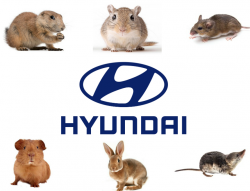
— A Hyundai soy-based wiring lawsuit alleges rabbits, mice, squirrels and other creatures chew wiring and other components because of the soy-based insulation.
The Hyundai soy-based wiring proposed class-action lawsuit includes all current and former owners and lessees of 2013-2016 Hyundai Veloster, Accent, Azera, Elantra, Equus, Genesis Coupe, Santa Fe, Sonata and Tuscon vehicles purchased or leased in California.
Plaintiff Michelle Martinez says her 2015 Hyundai Veloster has been damaged twice by rodents eating the soy-based wires, starting one morning in January 2017 when the vehicle would not start and was towed to the nearest Hyundai dealership.
Repairs were made to the wire harness which was damaged by rodents chewing on the wires and opening the connections, causing Martinez to be charged $250 when Hyundai refused to cover the damages under the warranty.
Two weeks later, the Veloster allegedly would not start and it was towed for repairs to open circuits, connectors and other parts of the wire harness. One of the repairs that was made included taping up the damaged wires.
The plaintiff was again charged $250 because Hyundai wouldn't pay for repairs under warranty. Martinez contacted Hyundai’s corporate office and was told by a representative that a case would be opened at the regional office level.
The plaintiff did not initially receive a response but was finally contacted by “Carolyn” from Hyundai, who offered to give “reward points” to use for the repairs.
The Hyundai lawsuit alleges the automaker denies there is a problem by using the soy-based wiring and since no defect exists, any replacement parts will also consist of soy products.
When an owner takes the vehicle for repairs due to the chewed wires, Hyundai merely removes the gnawed materials and installs the same soy-based wiring and engine-related components, resulting in a continuous cycle of failures. Because the damage isn't covered under warranty, owners can be left with spending up to thousands of dollars to replace wiring that rodents will once again attack.
According to the Hyundai lawsuit, until recently automotive wiring was coated or covered with petroleum-based plastic that did not attract rodents. But in the past few years, several automakers began replacing the insulation covering the wiring with soy-based insulators instead of the petroleum-based plastic.
Hyundai also started using soy-based materials to construct certain engine-related components because the soy is biodegradable and therefore more “environmentally friendly” than traditional petroleum-based plastics.
The lawsuit alleges thousands of Hyundai vehicles containing the soy-based materials have been sold or leased in California alone.
The plaintiff says rodents chew on numerous parts of Hyundai vehicles, including the hood insulation, battery wiring assembly and harness, filter assembly for the engine, wiring assembly and battery shims.
The Hyundai soy-based wiring lawsuit was filed in the U.S. District Court for the Central District of California - Michelle Martinez v. Hyundai Motor America, Inc.
The plaintiffs are represented by Shepherd, Finkelman, Miller & Shah, LLP, Goldenberg Schneider, LPA, and Robert W. Murphy.
Separately, a lawsuit has been filed against Kia over the same soy-based wiring insulation.




